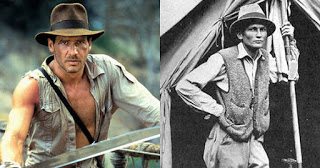But Will I Meet Harrison Ford? or the Romance of Travel

Why do so many romances take place in faraway lands? Is there something intrinsically romantic about visiting dirt-poor countries where the majority of the people still work at subsistence agriculture using stone age tools? Most of us would say not, yet many a romance does take a heroine to the old world, or the third world, or even to no world at all, if she happens to be on a cruise or get stuck on an island in the Pacific.
It’s standard that our romance heroine hobnobs with of the elite in these foreign climes. Depending on the era, the elite could be a batch of fellow tourists, a group of hardcore expatriates, or, most romantically, someone from the ruling class of that foreign country. A man with a title, perhaps. Or a man with a huge plantation. Possibly a man who is the master of some vast capitalistic enterprise.
We like a romance heroine to taste something of the exotic. That’s why she falls in love with a man from a different land. But so she doesn’t have to go too far out of her comfort zone, and thus the reader’s, the man she loves is usually Western-educated, affluent, and forward-thinking about the role of women. In fact, like all romance heroes, he’s a bundle of appealing characteristics.
But why a romance while traveling? Where they’d live once married does automatically become a huge issue between them. Plus in theory the heroine could meet the same hot foreign guy when he comes to New York on business or pleasure. Or San Francisco. Or LA. Or London.
Possibly travel romances happen because when we leave our daily grind behind, our senses become heightened. We come more alive, and we notice all the details of our surroundings. We notice other people more, too. The excitement of seeing new places can also make us a little wired, a little more apt to be daring. For a heroine who feels straitjacketed by her social world at home, traveling can be an opportunity to try on a new style, both in clothing and in behavior. If the travel is missionary work or eco-tourism, she’s likely to come into contact with people who think as she does, whatever their country of origin. Being thrown together with a very small group of like-thinking individuals can lead to romance. So can meeting a man who seems her complete opposite, yet who turns out to have a heart full of love for her.
There also are numerous adventure romances in which the heroine needs rescuing in a foreign country, and an all-American guy is the man for the job. In these, the hero is a familiar type–perhaps a rugged archeologist like Indiana Jones–and the rigors or difficulties of being in a strange country test the heroine’s mettle. Once again, the foreignness of another country becomes key to the story.
There’s another reason romances are set in faraway places. Although most of us can find beauty in our normal surroundings if we look, familiarity tends to dampen their allure. When we visit new places, their sheer majesty strikes us. Even the dire contrasts between the well-heeled in their mansions or tourist hotels and the impoverished locals selling postcards on the streets strike an emotional chord. Our heroine may hate her job back home, but seeing barefoot women carrying bundles on their heads reminds her how enviable her position actually is. At the same time, seeing how the other half lives, really seeing it, can connect the romance heroine emotionally to the people around her. Which also explains how she can even consider throwing up her old life to make her future with that aristocratic stranger she meets while traveling. It does not quite explain why she’d consider doing the same with a man like Indiana Jones.
